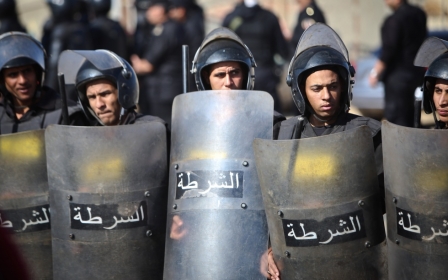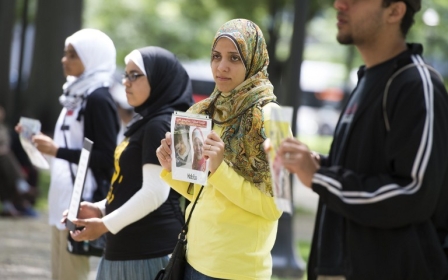New accounts suggest severe torture in Egypt is ongoing

Detainees across Egypt are being subjected to extreme physical and sexual torture in the country’s prisons and police stations, letters smuggled out of jail and family testimonies show.
Torture has long been practised by Egypt's security forces and has been condemned for decades by international human rights groups. New letters written by detainees and seen by Middle East Eye suggest the prevalence of torture is neither reducing in scope, nor in severity.
Since the beginning of 2014, there have been at least 120 deaths in custody, according to human rights group the Egyptian Commission for Rights and Freedoms.
In one letter shared with MEE, a man named Hassan Ali Ahmed, 29, who writes from the high security ward of Tora prison, describes being tortured both in prison and in the police station that he was taken to after his arrest.
The letter, dated 19 December 2014, details Ahmed's treatment in Basateen police station in 2012 and then in Tora prison. Ahmed says he was tortured at the police station on the orders of the station's then chief intelligence officer Khaled Abdel Moneim al-Demerdash.
Ahmed then writes of being consistently tortured in Tora prison, perhaps the most infamous of Egypt's many detention facilities. Writing from high security ward one, cell 16b, Ahmed claims that he was beaten and sexually assaulted, with his left arm broken during the violence.
On the orders of the head intelligence officer in Tora, whom Ahmed names as a man called Ahmed Ismail, Ahmed says he was made to “drink a mixture of water, oil, salt, washing powder, milk and tobacco” until he vomited for days on end.
Ahmed goes on to describe a place inside the ward where prisoners were sexually assaulted. “They strip our clothes and they carry pipes or hoses and they assault us with them,” he writes. “To escape this, you have to pay money.”
On the orders of the guards, Ahmed writes, criminal detainees “beat us with electric wires … they suspend us from our shoulders naked and keep laughing and mocking us.”
Dozens of recent cases
Letters and accounts collected by Aida Seif al-Dawla, the director of Egypt's Nadeem Centre for the Rehabilitation of Torture Victims and shared with MEE, detail dozens of other cases of torture, abuse and even killings in Egyptian custody in recent months.
“These torture stories ought to have an impact on Egypt's reputation and Sisi's international rehabilitation, but that is not the case,” said Andrew Hammond, senior policy fellow for the Middle East and North Africa at the European Council on Foreign Relations.
“The heightened tensions of the times are such that the Western countries have cast their lot and decided to support the Sisi regime and it's hard to imagine anything that is going to force them to reconsider,” he told MEE.
On 1 February, Khaled Meselhi was arrested at a protest near his house, according to his family. The very next day his family was called by a local police station and told they should come to collect his body. When Meselhi's wife visited the police station in Zaqazig, she discovered his face was a bloody mess.
The family were told by the police that Meselhi had died after falling from a building that he was attempting to burgle, something they dismissed as impossible.
Families of prisoners frequently claim that their loved ones are being tortured in Egyptian jails. In one case highlighted by the Egyptian NGO Nation Without Torture, the mother of a student named Hassan Gamal Hassan Rihan from Dakhaliya, writes that her son is still being tortured by security officers.
Accused of burning police cars and killing an officer, Hassan was arrested at a checkpoint on 27 January 2015. His family claim he disappeared for three days after his arrest, during which time the authorities denied any knowledge of his whereabouts.
“Then we found him in Mansoura One police station, barely alive from torture,” his mother writes in Nation Without Torture's appeal. “The torture continues with electricity to force him to sign a confession to false charges.”
Mansoura One
Mansoura One police station also features in accounts compiled by the Nadeem Centre, which lists a lawyer who wished to remain anonymous but who stated that according to his clients who were held at the station, its chief investigation officer, Sherief Abulnaga, had supervised in the torture of 13 men.
The centre describes the 13 men as having been “kidnapped” and denied access to the prosecution, their lawyers or their families. They were tortured in order to extract confessions to crimes including responsibility for a road block in Dakahliya governorate on the 25 January. They were beaten, electrocuted by the hands, feet and genitals until they lost consciousness.
A similar case arose on 8 February when young men being held in Shalal security camp in Aswan reported that they were tortured by the camp supervisor and other camp officers. The men were held blindfolded and are regularly tortured by electrocution as well being subjected to obscene verbal abuse and death threats in order to extract confessions.
ECFR's Andrew Hammond says this level of police abuse in Egypt can be partly explained by the Sisi government's melding of the approaches taken by autocratic leaders from Egypt's past, particularly Gamal Abdel Nasser and Hosni Mubarak.
“Under Hosni Mubarak police abuse became routine and widespread, beyond political cases,” he said, “and it seems that what we have now under Sisi is a mixture of the Nasser era repression and that of Mubarak - both political and routine abuse, Nasser plus Mubarak.”
Electrocution and silence
On 3 February, Human Rights Watch reported the case of Abdallah Shehata, a former Egyptian Finance Ministry advisor, and his brother who were subjected by interrogators to “electrocution and other mistreatment” to force them to confess to possessing weapons.
Shehata once led Egypt’s negotiations with the International Monetary Fund and has been detained since 28 November 2014.
“Government silence over reports that police electrocuted a university professor shows how far off course Egypt has drifted since the Arab Spring,” said Nadim Houry, HRW's deputy Middle East and North Africa director.
“While Egypt faces real security threats, the authorities are responding with methods that aggravate people’s grievances. The 2011 uprising was triggered in part by pervasive police brutality.”
A medical source cited by the Nadeem Centre detailed yet another case in which a lawyer was tortured in detention, but this time the victim appears to have died as a result of his injuries.
Karim Hamdy Mohamed, 27, died in Matareya police station on 24 February with “several broken ribs, bruises in his abdomen, chest and back probably resulting from kicks.” A forensic report also showed that he had 10 fractured ribs.
“Karim Hamdy Mohamed appears to have been tortured to death,” said Mohamed Elmessiry, Egypt researcher at Amnesty International. “And as a result, we've seen protests at the Lawyer’s Syndicate and a gag order on investigations into his case by the public prosecutor.”
According to the medical source, who asked to remain anonymous, Mohamed also had signs of haemorrhaging in his chest, abdomen and head. The Ministry of Interior claimed in a statement that Mohamed was arrested “from a terrorist cell” and accused him of possessing firearms.
Deaths in custody
Mohamed wasn't the only one to die in Matareya police station that week. Research by the Nadeem Centre and Amnesty International shows that two other men died in the station, one of them that same night.
The first was Emad Mohamed al-Attar, 48, who died in the station following his arrest on unspecified grounds, apparently as a result of refusal by officers to get him urgent medical attention.
Then a third man, Mustafa Mahmoud, died in the station days later. The Forensic Medical Authority refused to comment on the death but Elmessiry says there was some evidence he was forced into a stress position for hours prior his death.
According to a list compiled by local activists and the Egyptian Commission for Rights and Freedoms organisation, there have been at least 121 deaths in custody in Egypt since the beginning 2014.
A number of them have been in Matareya police station. Data from Amnesty International show that in total at least nine people have died in that police station since April 2014.
“The rise of deaths in custody is likely due to the fact that prisoners sentenced to one year or less are now serving their sentences in police stations themselves,” Elmessiry told MEE. “This leads to police station overcrowding, poor conditions, and that's why we're seeing a rise in deaths.”
'No basis in truth'
Egypt's Ministry of Interior did not respond to requests for comment on these deaths, or on torture in custody in Egypt in general.
However ministry spokesperson General Hani Abdellatif claimed in a statement to Egyptian news site Akhbarak on 4 February that allegations by human rights organisations about mistreatment of detainees imprisoned due to violations of protest laws “had no basis in truth”.
Egypt's prison population has spiked considerably since the armed forces ousted Mohamed Morsi in July 2013. The Arabic Network for Human Rights Information estimates that by the end of 2014, 42,000 people had been imprisoned in anti-Muslim Brotherhood arrests and a general crackdown on dissent.
Along with that spike in the prison population, the number of accounts of mistreatment and torture in Egyptian prisons has also increased, and shows little sign of slowing.
“A lack of accountability is the main reason behind the continuing ill-treatment and torture of detainees,” Amnesty's Elmessiry says. “So far we haven't seen any security officers held accountable for any killings or torture.”
Meanwhile, world governments are placing other priorities far above human rights abuses in Egypt, Hammond says.
“Sisi is seen as a critical ally on security issues, in Sinai, Libya and the wider Syria-ISIS issue, and his policies on Israel, while problematic on Gaza, are within the remit of what Western powers deem acceptable,” he told MEE. “He knows this, so knows that the police state can survive.”
Middle East Eye propose une couverture et une analyse indépendantes et incomparables du Moyen-Orient, de l’Afrique du Nord et d’autres régions du monde. Pour en savoir plus sur la reprise de ce contenu et les frais qui s’appliquent, veuillez remplir ce formulaire [en anglais]. Pour en savoir plus sur MEE, cliquez ici [en anglais].





